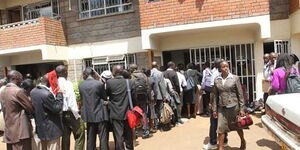President William Ruto is navigating turbulent political waters as he addresses a slew of demands from Kenya's youth, sparked by the anti-Finance Bill protests in June.
The youth, particularly Gen Z, have not only pushed for the withdrawal of the Finance Bill 2024 but also presented a formidable list of 14 additional demands.
With strategic manoeuvres, Ruto has managed to meet five of these demands, though several critical issues remain unaddressed.
Last month, a comprehensive list of demands surfaced online, adding to the existing call for the Finance Bill’s withdrawal. Our analysis reveals that Ruto has acted on three of these demands while six others, including a call for his resignation, are still pending.
Complete
Among his recent moves, Ruto announced the dismissal of all but one Cabinet member, partially meeting the demand to overhaul the Cabinet.
However, he retained Prime Cabinet Secretary Musalia Mudavadi, whose position is widely considered illegitimate. Mudavadi will continue to oversee ministerial affairs until a new, "broad-based" Cabinet is formed, highlighting the ongoing power struggles within Ruto's administration.
Gen Z's demands also called for the elimination of illegal and illegitimate positions, such as the Chief Administrative Secretaries (CAS) roles and the publicly funded offices of the First Lady, Second Lady, and Mudavadi’s wife.
Ruto has complied with this demand, but it remains uncertain whether the funds will be redirected to employ teachers and doctors as demanded.
In another significant move, Ruto accepted the resignation of Inspector General of Police Japhet Koome, aligning with the youth's demand.
On the employment front, Ruto has assured that all Junior Secondary School (JSS) teachers will be placed on permanent and pensionable terms by the end of 2024.
This commitment, made during the commissioning of a power substation in Kajiado County, reflects Ruto's attempt to address grievances despite the financial challenges posed by the Finance Bill's withdrawal.
In Progress
The demand for a detailed audit of the national debt has also seen partial progress. Ruto established a task force to audit the debt, but this effort was halted by the court following challenges to its constitutionality.
The court's temporary injunction highlights the legal and bureaucratic hurdles Ruto faces in addressing the youth's concerns.
Additional demands include the immediate constitution of the Independent Electoral and Boundaries Commission (IEBC) to facilitate the recall of rogue MPs and hold fresh elections. On this, Ruto has signed the IEBC Amendment Bill 2024 into law, paving the way for the appointment of a selection pannel that will conduct the vetting of commissioners.
On the demand for the re-employment of intern doctors on previous terms of Ksh206,400, Ruto's government has been embroiled in talks with the medical interns all week.
The Ministry of Health and medical interns reached an agreement to immediately post 552 interns and plan on how and when the government will post the others.
Despite the consensus, infighting among the interns has surfaced, threatening to derail the process. The Ministry and the interns are still negotiating the timeline for posting the remaining interns, and the salaries. The interns are holding out for Ksh206,400 per month as outlined in the 2017 CBA, but the ministry wants to pay Ksh70,000.
Pending
However, the Housing Levy remains a contentious issue. Young Kenyans demanded its abolition, an audit of the funds collected, and a refund of contributions. Despite these calls, Ruto has not budged, and the High Court recently upheld the levy, citing the complexity of reversing contracts and projects already underway.
The restoration of the Linda Mama program, which provides free maternity services, is another unresolved issue.
The other demand under health was the scraping of the Social Health Insurance Fund (SHIF). On this, Ruto is not budging.
However, on Friday, the court made decisions on the Social Health Insurance Act (SHIA) have added layers of complexity, with rulings suspended to allow for appeals and implementations within a set timeframe.
Moreover, Ruto has yet to address the demand to cap MPs' salaries and allowances at Ksh 200,000, dismiss officials with criminal records, and obey court orders.
The youth also called for the scrapping of the Women Rep position to reallocate funds towards increasing civil servants' salaries, and for government officials to use state-owned vehicles and aircraft to curb corruption and conflict of interest.
Restoring the school feeding program fund and increasing funding for education and health while cutting executive and legislative budgets are further demands that remain unmet.
These demands highlight the broader socio-economic concerns of Kenya's youth, who are pressing for systemic changes to address corruption, inefficiency, and inequity.
President Ruto's actions thus far reveal a complex interplay between bold reforms and entrenched challenges.
As he continues to navigate these demands, the youth's unwavering stance signifies a growing impatience for tangible, systemic change in Kenya's governance and socio-economic landscape.












